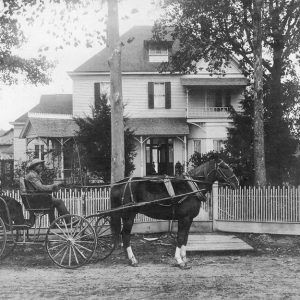calsfoundation@cals.org
William McCombs (1875–1921)
William Frank McCombs, born in Hamburg (Ashley County), became known nationally and internationally for promoting Woodrow Wilson as the Democratic Party’s candidate for the presidency of the United States and for serving as manager of Wilson’s successful campaign for election.
William McCombs was born on December 26, 1875, to William Faulkner McCombs and Mary Frances Pugh McCombs, whose family was among the most prominent in the area. He was one of six children—three boys and three girls. Permanently crippled in a fall during infancy, McCombs depended on the support of a cane for the rest of his life. He became an excellent student, taught by his mother and private tutors before enrolling in an exclusive preparatory school in Tennessee. Later, as a student at Princeton University, he took most of the classes taught by Woodrow Wilson, another Southerner whose intellect he greatly admired. McCombs served as editor of the Daily Princetonian student newspaper, was active in—and became president of—the Southern Club, was the leading orator in the American Whig Society, and graduated cum laude in 1898.
He then entered Harvard Law School and graduated in 1901 before opening law offices in New York City. His interest in politics led him to become a leader in the Democratic Party. When Wilson was persuaded to run for the governorship of New Jersey, McCombs contributed financially to the campaign and was convinced that Wilson would someday become president of the United States.
Before the Democratic National Convention in 1912, McCombs began to promote the nomination of Woodrow Wilson for president. He encouraged prominent journalists and editors to write articles supportive of Wilson’s nomination and distributed copies widely. He also encouraged Wilson to make an extensive speaking trip into the western states to acquaint himself with other areas of the country and to increase personal recognition. Wilson first feigned a lack of interest in running for the office and resisted recognizing McCombs as his campaign manager, partly because McCombs’s connection with Tammany Hall, the Democratic machine that controlled politics in New York for almost eighty years and was in conflict with Wilson’s policy of “open politics” and reform.
In early 1912, after Wilson agreed to stand for the position, McCombs’s leadership grew. He was influential in the politically advantageous selection of Baltimore, Maryland, as the convention site. At one point during the convention when support seemed at low ebb, Wilson sent McCombs a note instructing him to withdraw Wilson’s name from consideration, but McCombs pocketed the note without taking action. He worked tirelessly behind the scenes raising money, placating people whom Wilson had offended, making beneficial contacts, negotiating, garnering support from undecided candidates, and turning the tide from Champ Clark of Missouri, the leading contender, to a point at which Wilson was nominated on the forty-sixth ballot. After the convention, McCombs received high praise, being lauded for his management style and his efficient use of funds and effort. The Ashley County Eagle, his hometown newspaper, said, “Every newspaper in the United States…is heralding his praise.”
McCombs had overworked to the detriment of his health and morale, and several times suffered illnesses that incapacitated him. He had spent most of his own money to promote the campaign. After the election, Wilson, who was a devout Presbyterian, proclaimed that it was Providence that led to his election and told McCombs bluntly that he owed him nothing. He declined to offer McCombs a Cabinet position and ignored McCombs’s suggestions for people to fill the positions. Instead, he offered McCombs an appointment as ambassador to France, which McCombs could not afford financially.
Although McCombs considered Wilson brilliant, he found him a cold, distant, insincere opportunist who used Congress to promote his own whims and who crushed those who disagreed with him. McCombs wanted what he felt was best for the Democratic Party, and when Wilson encouraged him to take on the leadership of the Democratic National Committee, he agreed. This position, which he held from 1912 to 1916, proved to be troublesome and unrewarding, partly because of conflict with other Wilson followers who had undermined McCombs during the campaign.
During a trip to Europe to recover his health and his spirits, he was treated like a celebrity. His traveling companion described his visit as a “social joy ride,” and a well-known London clubman described him as “a wonderful social sensation, who conquers everything with silence and smiles, exhibiting the suavity and restraint the English admire as mannerism.” McCombs surprised Americans by his marriage in London in November 1913 to Dorothy Williams, an American whom he had met at Wilson’s inauguration. Their wedding was attended by many notables. The couple quietly divorced in March 1919.
Back in America, he returned to his law practice but continued work for the Democratic Party. Drafted to run as senator from New York in 1916, he was defeated. When Wilson began a push for reelection in 1919, McCombs predicted his defeat and made several cross-country trips to solidify anti-Wilson forces.
His health weakened by overwork and physical ailments, McCombs spent much of the last months of his life under medical care. He died on February 22, 1921. His body was returned to Little Rock after services in New York. In Little Rock, services were held at Second Presbyterian Church with interment at Roselawn Memorial Cemetery.
For additional information:
Lyons, Maurice F. William F. McCombs, the President Maker. Cincinnati: Bancroft Publishers, 1922. Online at http://www.archive.org/details/williamfmccombsp00lyonrich (accessed March 16, 2022).
Scott, Robert C. “William McCombs and the 1912 Presidential Nomination of Woodrow Wilson.” Arkansas Historical Quarterly 44 (Autumn 1985): 216–259.
Katherine Stanick
Little Rock, Arkansas
 Early Twentieth Century, 1901 through 1940
Early Twentieth Century, 1901 through 1940 William F. McCombs
William F. McCombs 



Comments
No comments on this entry yet.